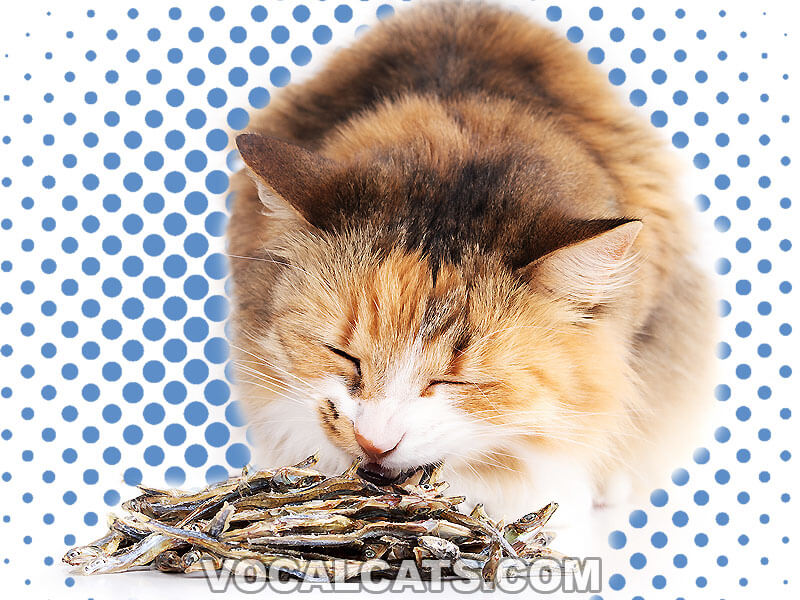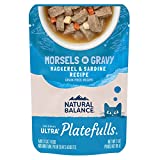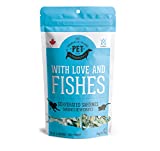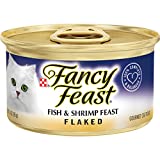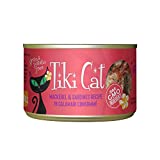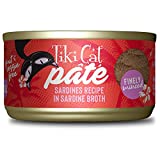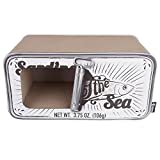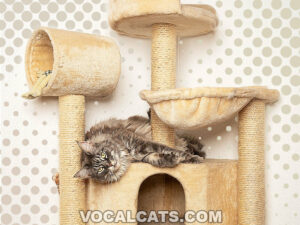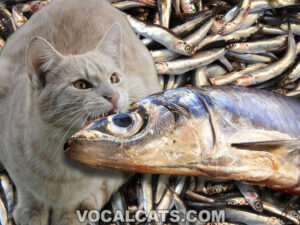Can Cats Eat Sardines? Yes, cats can eat Sardines in small quantities. These tasty treats are high in protein and nutrients like calcium, iron, copper, omega 3 fatty acids, and vitamin B12. As long as the Sardines aren’t packed in oil, brine or flavorings, they’re perfectly safe for your cats to eat.
The delicious smell and taste of Sardines will have your cats running to their food bowl. Cat parents often ask, “can I give my cat Sardines?” The short answer is yes, and in moderation. While Sardines are not a suitable meal replacement, they make for nutritious and tasty treats.
Similar to tasty anchovies, Sardines are an oily fish that can easily become your pet’s favorite treat. This guide will break down everything you need to know about feeding your cat Sardines, including their benefits and risk factors.
Contents
- Can Cats have Sardines?
- Are Sardines healthy for cats?
- Are Sardines good for Cats?
- Are Sardines good for cats with kidney disease?
- Sardines for Cats hairballs
- Sardines for cat constipation
- Are Sardines good for my cat with dry skin?
- Are Sardines bad for cats?
- Are Sardines ok for cats?
- Are Sardines safe for cats?
- Do Cats Eat Sardines?
- Do Cats like Sardines?
- Can I feed my cat Sardines everyday?
- Are Sardines good for cats every day?
- How often can cats eat Sardines?
- How much Sardines can I give my cat?
- How to cook Sardines for cats
- How to feed Cats Sardines?
- Can kittens Eat Sardines?
- Sardines for Cats
- Can Cats Eat Canned Sardines?
- Can Cats Eat Canned Sardines in oil?
- Can Cats Eat Canned Sardines in olive oil?
- Can Cats Eat Sardines in oil?
- Can Cats Eat Sardines in olive oil?
- Can Cats Eat Sardines in soybean oil?
- Can Cats Eat Sardines in sunflower oil?
- Is Sardine oil good for cats?
- Sardine oil for cats
- Can Cats Eat Canned Sardines in water?
- Can Cats Eat Sardines in water?
- Can Cats Eat Sardines in spring water?
- Can Cats Eat Sardines in brine?
- Can Cats Eat Sardines with bones?
- Can Cats Eat Sardine bones?
- Can Cats Eat Sardines in tomato sauce?
- Is tomato Sardines good for Cats?
- Can Cats Eat Canned Sardines in tomato sauce?
- Can Cats Eat dried Sardines?
- Can Cats Eat raw Sardines?
- Can Cats Eat Sardines in mustard?
- Can Cats Eat spicy Sardines?
- Can Cats Eat whole Sardines?
- Can Cats Eat fresh Sardines?
- Can Cats Eat smoked Sardines?
- Sardine Cat Food
- Sardine Cat Treats
- Other Sardine Cat Products Your Cats Will Love
- So, Can Cats Eat Sardines?
- Related Questions
Can Cats have Sardines?
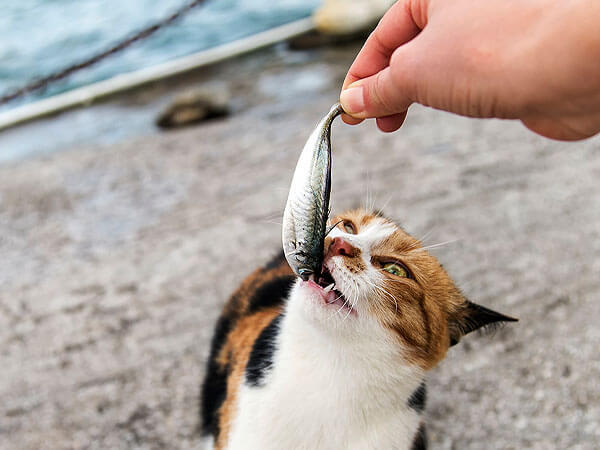
Yes, Cats have Sardines! When it comes to cats eating Sardines there are few things you need to keep in mind.
You can feed your cat around half a can of Sardines once or twice a week. Sardines packed in water are the safest option, while Sardines packed in oil, brine, tomato sauce, and other seasonings should be avoided at all costs.
Alternatively, you can also boil or steam fresh Sardines for your cat. Since the bones are small and soft, they’re not generally a choking hazard.
If this is your kitty’s first time trying Sardines, keep an eye out for any adverse reactions or unusual symptoms like diarrhea or vomiting.
RECOMMENDED: Can Cats Eat Shrimp?
Are Sardines healthy for cats?
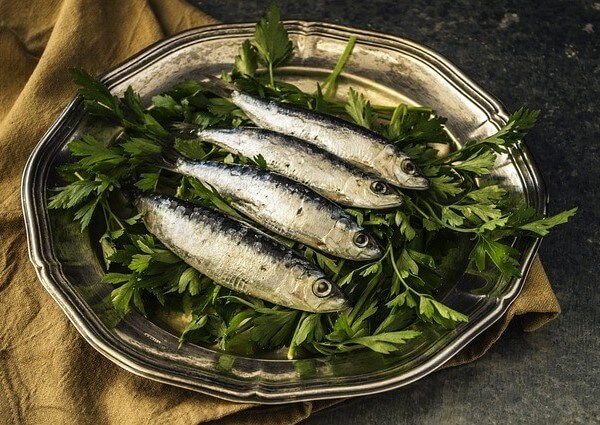
Yes, Sardines are a healthy treat option for your cats. Overall, Sardines contain healthy doses of protein, calcium, iron, copper, omega 3, and vitamin B12 that will strengthen your cat’s bones, joints, kidneys, and heart.
HANDY HINT: Lobsters is also a good source of essential nutrients and protein. But can cats have Lobster? Find out in our Can Cats Eat Lobster? guide!
Are Sardines good for Cats?
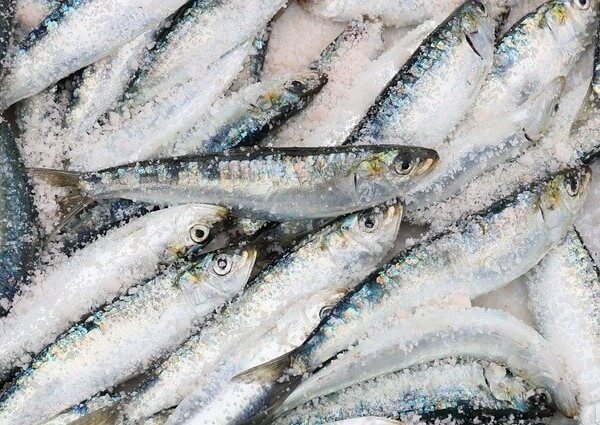
Yes, Sardines are good for cats. From heart health to mood improvement, there are numerous health benefits of Sardines for cats. Here are some of the reasons why you should add Sardines to your pet’s diet.
1. Improves Brain Health
With omega 3 fatty acids such as DHA and EPA, Sardines can boost your cat’s brain health. These essential nutrients are known to improve cognitive function.
2. Strengthens Bones and Joints
Sardines are a great source of protein and calcium which can strengthen your cat’s bones and joints. Minerals like iron and copper work together to generate red blood cells, boost immunity, and maintain bone health. This keeps your cat agile as they grow older.
3. Provides Hydration
As a feline parent, you constantly have to make sure your fuzzy friend is drinking enough water. This is especially true if you have them on a dry food diet. Sardines can help provide hydration for your cat.
4. Prevents Cancers
The omega 3 acids in Sardines are also known to help prevent tumors and resist cancers, keeping your feline friends in good health. When it comes to the question of “Is Sardines good for cats?” the research is quite clear.
5. Uplifts Mood
Like many pets, cats can suffer from mental disorders like anxiety and depression. The anti-inflammatory properties in Sardines can definitely uplift your cat’s mood when they’re feeling stressed or anxious.
6. Promotes Heart Health
The high doses of vitamin B12 found in Sardines are known to strengthen your cat’s cardiovascular system so they have better heart health.
DON’T MISS: Can Cats Eat Mackerel? (Raw, Canned, Oil, Tomato Sauce)
Are Sardines good for cats with kidney disease?
Is there any benefit to offering Sardines for Cats with kidney disease? Yes, definitely!
According to News Medical Life Sciences, omega-3 fatty acids found in Sardines may reduce the effects of kidney disease by reducing inflammation, facilitating blood flow to the kidneys, and lowering elevated blood pressure often associated with kidney problems. This ultimately supports kidney function and overall health in cats.
Additionally, a major issue for cats with kidney disease is a loss of appetite. The delicious smell and taste of Sardines may entice a sick cat into consuming more protein.
So if you’re wondering, “Can I feed my cat Sardines?” The answer is yes, you can definitely feed your cat Sardines.
Sardines for Cats hairballs
One of the best ways to deal with hairballs in cats is to add healthy oils to their diet. A small portion of Sardines or tuna once a week provides increased moisture content which can help lubricate your cat’s digestive system. This makes it easier for hairballs to pass through the system.
Sardines can also help cats with hairballs because they are a rich source of omega-3 fatty acids, which support a healthy skin and coat. A healthier coat means less shedding, and consequently, fewer hairballs.
As we can see, having a small amount of Sardines is a great way to get rid of those pesky hairballs.
READ ALSO: Can Cats Eat Imitation Crab? Purr-suing the Truth About Surimi!
Sardines for cat constipation
Should Cats eat Sardines if they have constipation? Yes, cats can absolutely eat Sardines if they have constipation.
Cats that suffer from repeated bouts of constipation require permanent diet changes.
You can add a mixture of water canned Sardines and chia seeds to quickly solve your pet’s digestive issues.
If you’re still worried, we advise that you speak with your cat’s vet to seek their professional advice on what you can do if your fuzzy friends suffer from chronic digestive disorder.
Are Sardines good for my cat with dry skin?
Cats with dry skin can benefit from the rejuvenating properties of the omega-3 fatty acids. When you add Sardines to their diet, you’ll notice an immediate improvement in their skin and coat.
Are Sardines bad for cats?
Despite their numerous health benefits, feeding your cat Sardines can come with certain health risks. Understanding how to properly prepare Sardines for your furry family member is the best way to avoid these pitfalls.
So what are some Sardines for Cats side effects?
1. Gastrointestinal Diseases
If you feed your cat Sardines that come packed in oil, spices, or tomato sauce you’re putting them at risk of developing gastrointestinal diseases. Your cat’s digestive system is delicate and overburdening it can quickly lead to stomach issues.
2. Kidney Issues
Many types of canned Sardines have extremely high quantities of sodium. This is the primary reason why you should avoid feeding your cat canned Sardines that’s brined in salt or oil. An excessive amount of salt in their diet can be toxic for cats.
That’s because too much sodium intake can exacerbate kidney problems. Kidneys play a vital role in maintaining the body’s fluid balance and regulating electrolyte levels, including sodium.
When a cat has kidney issues, his kidneys may struggle to filter out and get rid of excess sodium efficiently.
This can lead to increased blood pressure, fluid retention, and worsening kidney function.
Additionally, high sodium levels can cause increased thirst and urination, further stressing the kidneys.
If your cat has kidney issues, it’s important to follow a veterinarian-recommended diet that includes controlled sodium levels to support kidney health and overall well-being.
3. Chronic Fatigue
Raw Sardines hold an enzyme called thiaminase which is responsible for breaking down vitamin B into a form that cannot be used by your cat’s body. If your pet’s digestive system becomes low in vitamin B they may suffer from chronic fatigue.
4. Cuts or injury
Feeding your cat straight out of the can is a bad idea because your pet can get cuts on their lip or tongue.
5. Parasites
Raw Sardines may also contain bacteria and parasites that can wreak havoc on your cat’s digestive system.
Some of these parasites and bacteria include:
- Anisakis: A type of roundworm that can cause gastrointestinal issues, such as abdominal pain, nausea, and vomiting, in cats.
- Diphyllobothrium: A fish tapeworm that can cause weight loss, diarrhea, and anemia in infected animals.
- Salmonella: A common bacterial pathogen that can cause gastrointestinal illness, fever, and diarrhea in cats.
- Listeria monocytogenes: A bacterium that can cause listeriosis, which may lead to severe illness, particularly in young, elderly, or immunocompromised individuals, including cats.
- Vibrio: A group of bacteria that can cause gastrointestinal issues, such as vomiting and diarrhea, in cats.
If you’re preparing Sardines from scratch, you should properly prepare and cook them before serving your pet. This will help minimize the risk of parasites and bacteria.
If you’re considering adding Sardines to your cat’s diet, consult your veterinarian first for guidance on safe preparation and feeding.
6. Allergies
There’s a slight chance your cat may be allergic to Sardines. Allergies can pop up through symptoms like diarrhea, constipation, sneezing, or a change in behavior.
READ NEXT: Can Cats Eat Crab?
Are Sardines ok for cats?
Now you may be wondering this question: Is it okay for cats to eat Sardines? Yes, Sardines are perfectly healthy as long as they’re cooked in water, with no additives, oil, or spices.
Are Sardines safe for cats?
Yes, Sardines are safe when cooked. Raw Sardines put your cat at risk of diseases, bacteria, and parasites (as we’ve discussed above).
If you’re buying canned Sardines, make sure they are packed in water and not brine, tomato sauce, seasonings, or oils. These additives and flavorings can be harmful or toxic to cats, especially if they’re high in salt.
Do Cats Eat Sardines?
Yes, cats do eat Sardines. In fact, Sardines are a popular treat for cats and they are a great source of protein, omega-3 fatty acids, and various essential nutrients that can benefit your cat’s overall health.
However, it’s important to feed your cat Sardines in moderation, and they should be cooked and deboned before serving.
Always consult your veterinarian before introducing new foods to your cat’s diet.
Do Cats like Sardines?
Most cats like Sardines because of their fishy taste and smell. In fact, there’s a chance your cat may start craving these treats more than their regular food.
If you’re going to give them Sardine snacks, make sure to choose the best one.
Can I feed my cat Sardines everyday?
No, you should not feed your cat Sardines everyday because this puts them at risk of obesity and other illnesses. Also, if your cat becomes addicted to the taste of Sardines they may start rejecting their regular food and will not receive a proper, well-balanced diet.
Are Sardines good for cats every day?
Sardines will not be able to provide your cats with enough protein or other nutrients to replace their primary meal. That is why Sardines are not good for cats every day.
How often can cats eat Sardines?
At most, you can feed your cat one can of Sardine a week, divided into smaller portions over several days.
How much Sardines can I give my cat?
The ideal way to feed your cat Sardines is by giving them half a can of Sardines, twice a week.
How to cook Sardines for cats
While canned Sardines in water is one option to offer your cats, you can also choose to cook Sardines for them. Boiling or steaming the Sardines is the best way to prepare them for your pet. Here are a few steps you can take to cook Sardines for your four-legged friends.
Step 1: Boil or steam the frozen Sardines.
Step 2: Chop the cooked Sardines into small pieces.
Step 3: Add the pieces to a food processor and turn them into a paste.
You can add the Sardine paste as a food topper or as a treat.
How to feed Cats Sardines?
Sardines are an amazing snack for your cats. These tasty and nutritious treats can be served in a number of ways.
- Add a small piece of boiled, steamed, or grilled unseasoned Sardine to your cat’s meal.
- Turn your tinned Sardines into a meatloaf.
- Serve them Sardine paste.
Can kittens Eat Sardines?
Kittens can eat Sardines occasionally, but no more than ¼ to ½ of a can over the course of a week. That’s because Sardines can provide your kittens with protein and essential nutrients needed for their growth and development.
However, it’s crucial to feed them cooked, deboned Sardines without the added salt or spices. It’s also important to remember that Sardines should not replace a balanced kitten diet but can be offered as an occasional treat.
It’s best to always consult with your veterinarian before introducing new foods to your kitten’s diet.
Sardines for Cats
Despite their convenience, canned Sardines are not always suitable for cats. When it comes to tinned goods you have to make sure you’re only feeding your pet safe options.
Can Cats Eat Canned Sardines?
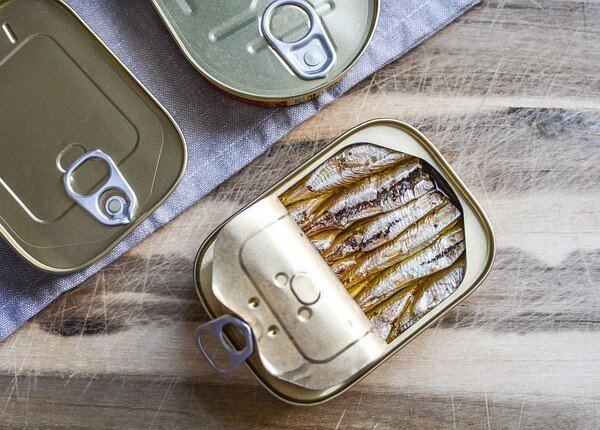
Pet parents often ask, Can I feed my cat canned Sardines? Yes, cats can eat canned Sardines as long as they do not contain unsafe additives, oil, and salt.
Since most store-bought Sardines are meant for humans, they are packed in ingredients like brine, tomato sauce, mustard, herbs and spices that are not suitable for a cat’s diet.
When it comes to feeding cats canned Sardines you must avoid brine packed Sardines under all circumstances. With their high salt content, brine packed Sardines are toxic for cats and can lead to severe sodium-ion poisoning.
The popular tomato sauce Sardines contain onions, garlic, salt, pepper, and spices mixed into tomato puree. These ingredients are harmful for your cats and should be avoided.
Your safest options are to either homecook fresh, frozen Sardines or purchase water tinned Sardines for cats that contain zero additives.
So, if you’re still wondering, “Can my cat Eat Canned Sardines?” the answer is yes, if it is canned Sardines with just water and nothing else.
Can Cats have Canned Sardines?
Yes, cats can eat canned Sardines that are packed in water.
Are canned Sardines good for cats?

Yes, Sardines packed in water provide your cat with essential nutrients like protein, calcium, iron, copper, vitamin B12 and omega-3 fatty acids. When it comes to the question of, Are canned Sardines good for cats? The answer is yes, in small quantities or in moderation.
Are canned Sardines ok for cats?
Canned Sardines that are packed in water are okay for cats to eat. Canned Sardines that are packed in brine, tomato sauce, oils, or mustard are not ok for cats and they may even be toxic for your pet.
Do cats like canned Sardines?
Most cats love the taste of canned Sardines and can’t get enough of this tasty treat. It’s unlikely your cat will refuse to eat a tasty bowl of Sardines.
However, if you want your pet to enjoy the Sardine flavor without feeding them straight out the can you can always try Sardine-flavored cat food options.
So if you’re looking to give your cat the best canned fish, check it out as it will have your cats running to their bowls. This gourmet recipe uses high-quality ingredients that result in a mouthwatering aroma and taste.
Tiki Cat food Sardine cutlets is one of the best canned Sardines for cats. Customers rave about the results these cutlets have had on their cat’s fur and skin.
If you’re looking to diversify and serve your furry friend another one of the best canned Sardines for cats, why not give Tiki Cat Sardines and mackerel a try. This low carb delicacy will wow your cat’s taste buds and have them meowing for more. Protein-rich and high in essential nutrients, this treat will leave your furry friends craving more.
Finally, this is another one of the best canned Sardines for cats. It comes in a smooth texture and rich smell, designed to entice your cat’s scent glands.
Can Cats Eat Canned Sardines in oil?
If you’re enjoying canned Sardines in oil and your feline friends are begging you for some, you may start to wonder, “Can my cat eat Sardines packed in oil?”
The answer is no, cats should not eat canned Sardines in oil. While some oils are safe in small amounts, others can be toxic for your cats.
For instance, soybean oil is a hormone disruptor that is toxic for cats, while sunflower oil may cause vomiting and diarrhea in large quantities.
If your cat loves Sardine oil, here’s a pharmaceutical grade Sardine anchovy oil for your feline friends.
Can Cats Eat Canned Sardines in olive oil?
Yes, cats can eat canned Sardines in olive oil, but it’s better to opt for Sardines packed in water with no added salt.
Olive oil contains fats that are not harmful to cats. However, our furry pals don’t need the extra calories.
Additionally, some canned Sardines contain high amounts of salt, which can be harmful to a cat’s health, especially for those with kidney issues.
Remember that adult cats should not have any more than 41 mg of salt per day. Any more than this can lead to sodium poisoning in cats.
So, although olive oil is relatively safe for cats in small amount and in moderation, pet parents should be cautious while feeding their cats canned Sardines in olive oil because it can act as a laxative. Consuming large amounts of olive oil can cause diarrhea in cats.
Additionally, small amounts olive oil can help treat constipation and remove hairballs from your cat’s digestive tract.
Can Cats Eat Sardines in oil?
So, if you’re still wondering, “can I feed my cat Sardines in oil?” the answer is no. It’s best to feed your furry friends plain, cooked Sardines without any oil or seasonings.
You’ll want to avoid feeding your cat Sardines in oil or canned Sardines in oil. Soybean oil, in particular, is toxic for cats. However, small amounts of olive oil or sunflower oil will not harm your pet.
Can cats have Sardines in oil?
No, cats should not have Sardines in oil. While Sardines in oil is not toxic or poisonous to cats, it is not the best option.
It’s better to choose Sardines packed in water because the oil in canned Sardines can be high in calories and may cause gastrointestinal upset, such as diarrhea, if consumed in large quantities.
If you’ve bought Sardines canned in sunflower oil or olive oil, you can drain the oil and rinse them with water. This will remove any excess oil before you offer them to your cat. If the Sardines are canned in soy oil or soy brine, avoid feeding it to your cat altogether.
Also, remember that Sardines should be an occasional treat and not a daily staple in your cat’s diet.
Are Sardines in oil good for cats?
No, Sardines in oil are not healthy for cats. The only time you should purchase Sardines in oil for cats is if they are constipated. Even then, you should choose Sardine in olive oil or sunflower oil.
Can Cats Eat Sardines in olive oil?
By now, you probably know the answer to this question: Can my cat eat Sardines in olive oil?
Yes, cats can eat Sardines in olive oil, but again it is not the best option. Olive oil can be high in calories and may cause gastrointestinal upset, such as diarrhea, if consumed in large quantities.
Therefore, it is preferable to choose Sardines packed in water for your cat.
However, a small amount of Sardines in olive oil is fine because this type of oil is known to improve the skin and coat health for cats, giving them smooth and shiny fur. You can also buy Sardines in olive oil for cats suffering from constipation or regular hairball issues.
Should you choose to feed your cat Sardines in olive oil, a small amount is key. Otherwise, make sure to drain the oil and rinse the Sardines with water to remove any excess oil before offering them to your cat.
Keep in mind that Sardines should be given as an occasional treat rather than a regular part of your cat’s diet.
Can Cats have Sardines in olive oil?
So, if you’re still wondering, “Can I give my cat Sardines in olive oil?” the answer is yes, cats can have Sardines in olive oil occasionally and in moderation.
Olive oil itself is not toxic to cats, but consuming too much can lead to issues such as weight gain and digestive problems.
When offering sardines in olive oil to your cat, it’s best to do so occasionally. It’s advisable to drain the oil before serving to minimize any potential health risks.
Are Sardines in olive oil good for cats?
Yes, Sardines in olive oil can be good for cats if they’re given to cats as an occasional treat. That’s because olive oil are packed full of essential nutrients like omega-3 fatty acids.
Additionally, Olive oil can act as a treatment to ease digestion. This can help cats on dry food diets that suffer from regular constipation.
However, while olive oil isn’t toxic to cats, consuming too much can lead to digestive issues.
Additionally, you should ensure that the Sardines in olive oil are low in salt, as excessive sodium can be harmful to cats. That’s why it’s best to offer Sardines in water, without added salt or oil. This is a healthier option for your feline friend.
Can Cats Eat Sardines in soybean oil?
There are a number of popular brands on the market that sells Sardines in soybean oil. If you’re enjoying Sardines in soybean oil and your cat is pawing you for some, you may be wondering, “Can I feed Sardines to my cat?”
The answer is no, cats should not eat Sardines in soybean oil. While soybean oil is not toxic or poisonous to our furry friends, it is not the healthiest type of oil for them.
Here’s why.
Imbalanced Fatty Acids
Soybean oil is high in omega-6 fatty acids and low in omega-3 fatty acids. An imbalance of these fatty acids may contribute to inflammation and exacerbate certain health conditions in cats.
Weight Gain
Soybean oil is calorie-dense, and if consumed in excessive amounts, it can contribute to weight gain, leading to obesity and related health problems.
Allergic Reactions
Some cats may be allergic or sensitive to soybean oil, which can lead to gastrointestinal issues or skin irritations.
Digestive Issues
Cats have evolved to primarily consume animal-based proteins and fats. Soybean oil is a plant-based fat, and some cats may have difficulty digesting it, potentially leading to diarrhea or vomiting.
Poor Nutrient Absorption
Soybean oil can interfere with the absorption of essential nutrients like vitamins and minerals, leading to potential deficiencies.
GMO Concerns
Soybean oil is often derived from genetically modified (GMO) soybeans, which are engineered to withstand herbicides and pesticides.
While there is still debate on the long-term effects of GMOs, some pet owners prefer to avoid them due to potential health risks, environmental concerns, or ethical reasons.
Feeding your cat Sardines in soybean oil may inadvertently introduce GMOs into their diet, which you may want to avoid for their health and well-being.
Can Cats have Sardines in soybean oil?
As you can see from the answer above, cats should not have Sardines in soybean oil. Soybean oil isn’t the healthiest oil for our feline friends. It has been known to cause thyroid damage by disrupting the hormone balance in your pet’s body.
Can Cats Eat Sardines in sunflower oil?
What about sunflower oil? Can I give Sardines to my cat that is in sunflower oil? Yes, cats can safely eat Sardines in sunflower oil in moderation and in small quantities.
That’s because sunflower oil can offer some health benefits for cats when consumed in moderation. These benefits include:
Omega-6 fatty acids: Sunflower oil is a good source of linoleic acid, an essential omega-6 fatty acid that cats need to obtain from their diet. Omega-6 fatty acids help to support healthy skin and coat, maintain cell membrane structure, and support the immune system in cats.
Vitamin E: Sunflower oil is rich in vitamin E, a fat-soluble antioxidant that helps protect cells from damage caused by free radicals. Vitamin E is important for maintaining healthy skin and coat in cats, as well as supporting the immune system.
Energy source: Like other fats, sunflower oil provides a concentrated source of energy that can help support a cat’s overall health and activity levels.
While sunflower oil can offer some benefits to cats, it’s important to remember that our feline friends should consume it in moderation. Too much oil in a cat’s diet can lead to gastrointestinal issues or contribute to obesity. It’s also essential to ensure that your cat’s overall diet is well-balanced and meets all their nutritional needs.
Can cats have Sardines in sunflower oil?
Yes, cats can have Sardines in sunflower oil as long as they consume it in moderation. The key is to completely drain the oil before serving the Sardines to your pet. The oily residue on the fish should be fine and will not upset your cat’s stomach.
Is Sardine oil good for cats?
Yes, small amounts of Sardine oil is good for cats as it can can improve the sheen and quality of your cat’s fur. However, it’s important to note that not all types of oils are good for cats. While olive oil is safe for cats, soybean oil and large amounts of sunflower oil are toxic for pets.
Sardine oil for cats
Sardine oil is great for cats because it can be used as a treatment option for constipation and hairballs. Additionally, it can be used as a supplement to improve your furry friend’s coat and skin.
One amazing Sardine oil cats can have is the Iceland Pure Sardine Anchovy Oil (Unscented) designed especially for cats and dogs.
Completely safe for breeds of all ages, the Sardine oil can boost your furry friend’s immunity, repair skin cell damage, reduce inflammation, and promote heart health.
Can Cats Eat Canned Sardines in water?
As you can see by now, cats can eat Canned Sardines in water. This is, in fact, the safest option for your fuzzy friends.
So if you’re still wondering, Can you feed a cat Sardines that’s packed in water? the answer is yes, absolutely! Canned Sardines in water are the healthiest option for your cat.
Can Cats Eat Sardines in water?
Yes, cats can eat Sardines in water. In fact, sardines packed in water are a healthier option compared to those packed in oil, as they have fewer calories and less fat content.
Sardines in water are a good source of protein, omega-3 fatty acids, and essential nutrients for your cat, but it’s important to feed them in moderation as part of a balanced diet.
As we can see, there are numerous health benefits of feeding your furry pals Sardines that are in water. They are perfectly safe and do not contain any harmful ingredients.
Can cats have Sardines in water?
Yes, cats can have Sardines in water as long as there are no other additives or flavorings.
Can Cats Eat Sardines in spring water?
Yes, cats can eat sardines in spring water. Sardines packed in spring water are a healthier option for cats compared to those packed in oil or with added salt.
Spring water does not contain added sodium or unhealthy fats, making it a safer choice for your feline friend. However, moderation is key, and Sardines should only be offered as an occasional treat to supplement your cat’s regular diet.
Can Cats Eat Sardines in brine?
Can you feed Sardines to cats if they are canned with brine? No, Sardines packed in brine can be toxic for cats because of the high quantities of sodium. The excessive amount of salt in these Sardines can cause serious health problems including salt toxicity and even death.
Can Cats Eat Sardines with bones?
Sardines have small and soft bones. Adult cats will have no problems eating Sardines with bones, however, the same cannot be said for kittens who may struggle to break them apart.
Overall, can you feed cats Sardines with bones? The answer is yes, but make sure you’re monitoring your feline friends when they are consuming Sardines with bones.
Can Cats Eat Sardine bones?
Yes, cats can eat Sardine bones, which are small enough to not be a choking hazard. However, make sure to watch your cat closely when they’re eating the Sardine with bones.
Can Cats Eat Sardines in tomato sauce?
A common question pet parents ask is, “Can I feed my cat Sardines in tomato sauce?” That’s because these are the type of tinned Sardines you’ll see in most people’s refrigerators and cupboard.
However, Sardines in tomato sauce for cats is not a good idea because of the additives, preservatives, and salt included in the tomato sauce.
Can cats have Sardines in tomato sauce?
No, cats should not have Sardines in tomato sauce. Some of the ingredients in tomato sauce such as spices, onion, and garlic are toxic to cats. Also, the high quantity of salt in this sauce can ruin your cat’s digestive system.
Therefore, it’s best to stick to Sardines in plain water for cats.
Is tomato Sardines good for Cats?
No, tomato Sardines are not good for cats. In fact, the tomato sauce or any other type of sauce used in canned sardines is not a necessary ingredient for cats. As mentioned above, they can contain ingredients that are harmful and toxic to our feline friends.
It is recommended to choose plain Sardines in water as an occasional treat for cats. If you want to add some flavor to your cat’s diet, it is better to use safer ingredients such as cooked chicken or canned pumpkin.
If you’re cat is craving Sardine or Sardine cat food, give your cat this instead:
It’s important to always check with your veterinarian before introducing new foods to your cat’s diet.
Can Cats Eat Canned Sardines in tomato sauce?
So, can you feed your cat Sardines? Not if they are in tomato sauce.
Can Cats Eat dried Sardines?
Yes, cats can eat dried Sardines as a healthy snack or supplement to their regular diet. Dried Sardines are high in protein and omega-3 fatty acids, which can benefit a cat’s overall health and well-being. Prepared dried Sardines for cats are single ingredient treats that have no additives, preservatives, or salt.
However, as with any new food, it’s important to introduce dried Sardines to your cat’s diet gradually and slowly to avoid any digestive upset.
It’s also important to choose high-quality, unsalted dried Sardines that are free from any additives or preservatives. Additionally, it’s best to serve dried Sardines as an occasional treat and in moderation rather than as a regular part of your cat’s diet.
Are dried Sardines good for cats?
Yes, dried Sardines can be a healthy and nutritious treat for cats. They are high in protein and omega-3 fatty acids, which can help promote healthy skin and coat, reduce inflammation, and support overall health.
However, it is important to feed them in moderation as too much can cause digestive issues or contribute to weight gain.
It is also recommended to choose high-quality, human-grade dried Sardines without added preservatives or flavorings.
Can Cats Eat raw Sardines?
No, cats should not eat raw Sardines since they may be hosts to harmful bacteria like salmonella, listeria, clostridium, and vibrio that can cause massive damage to your cat’s immunity and digestive system. We recommend that you do not feed your cats raw Sardines.
Can Cats Eat Sardines in mustard?
No, cats should not eat Sardines in mustard. It is not recommended to feed cats Sardines in mustard because mustard contains onion and garlic powder, salt, and other spices that may lead to the following potential health issues in cats:
- Anemia.
- Upset stomach.
- Digestive upset.
As we can see, mustard is not suitable for cats. It is best to stick to plain Sardines in water for feline consumption.
Can Cats Eat spicy Sardines?
No, cats should not eat spicy Sardines. In general, spicy food can cause digestive upset and even pain in cats.
Spicy Sardines can have a variety of ingredients depending on the recipe or brand, but some common ones include chili peppers, vinegar, garlic, onion, salt, and other spices. These ingredients are harmful to cats and they can even cause gastrointestinal upset and discomfort.
It’s best to avoid feeding spicy Sardines or any other spicy foods to cats, as they may not tolerate it well.
Ideally, you’ll want to stick to plain Sardines without any added spices or seasoning for cats.
Can Cats Eat whole Sardines?
Yes, adult cats can eat whole Sardines as they are a good source of protein, omega-3 fatty acids, and other nutrients that are beneficial for cats.
However, it is important to ensure that the Sardines are fully cooked and deboned to avoid any potential choking hazards or digestive issues.
Additionally, it is recommended to limit the amount of whole Sardines given to cats as they are high in calories and fat.
Can Cats Eat fresh Sardines?
Yes, cats can eat fresh Sardines, provided that they are properly cooked, bone-free, and shredded into small pieces to make cat treats.
Raw or undercooked Sardines can contain harmful bacteria and parasites, while bones can cause choking, digestive problems, or even puncture the digestive tract. If you plan to feed your cat fresh Sardines, it’s best to consult with your veterinarian first to ensure that it’s a safe and healthy option for your feline friend.
Can Cats Eat smoked Sardines?
No, cats should not eat smoked Sardines because they are often high in sodium, which can be problematic for cats with certain health conditions like kidney disease.
If the smoked Sardines is free from seasonings and flavorings, then you can share a tiny piece with your feline friends.
If you’re still unsure, it’s best to check with your veterinarian before adding any new food to your cat’s diet.
Sardine Cat Food
If you’re looking for an easy Sardine cat food recipe to make, or if you don’t have time to prepare cat food at home, you can buy Sardine flavored cat food. Alternatively, you can choose cat food Sardines like the Natural Balance Platefulls Cat Food (Mackerel & Sardine in Gravy) which is great for cats of all ages.
Sardine Cat Treats
The Granville Island dehydrated Sardine treat is a premium cat treat with no preservatives or chemicals. This protein rich treat will not only delight your cat’s taste buds, but also strengthen their immune system.
Other Sardine Cat Products Your Cats Will Love
Did you know that there is a Sardine can cat scratcher? If your cats love to scratch, but you don’t want to ruin your hardwood floor, baseboard, or furniture, it’s a good idea to invest in the District 70 Sardine cat scratcher.
This creative Sardine-shaped design will not only satisfy your cats’ natural scratching instincts but also helps protect your furniture.
So, Can Cats Eat Sardines?
Overall, Sardines are an amazing treat option for your cats. Your best options are to either cook fresh plain Sardines at home or buy canned Sardines in water. Avoid all kinds of preservatives, oils, and sauces.
Related Questions
Your cats may enjoy treats like canned Sardines, canned tuna, and canned salmon. Fish can add an essential dose of omega-3 fatty acids to their diet.
DISCLAIMER: THIS WEBSITE DOES NOT PROVIDE MEDICAL ADVICE
The information, including but not limited to, text, graphics, images and other material contained on this website are for informational purposes only. No material on this site is intended to be a substitute for professional veterinary advice, diagnosis, or treatment. Always seek the advice of your veterinarian or other qualified health care provider with any questions you may have regarding dietary needs.
Resources:
https://www.webmd.com/diet/health-benefits-sardines
https://spo.nmfs.noaa.gov/sites/default/files/legacy-pdfs/CIRC90.pdf

With over five years of specialized experience as an animal writer, my expertise lies in cat nutrition, health, behavior, grooming, and training. I am dedicated to delivering helpful and informative content that caters to the well-being of our feline friends. My primary goal is to empower pet owners with knowledge and ensure our feline companions thrive in health and happiness. In my free time, I love volunteering at local cat rescue centers.
